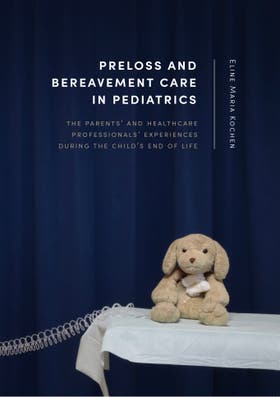Eline Kochen
Preloss and bereavement care in pediatrics

- Datum
- (Co) promotoren
- 25-10-2023
- prof. dr. S.C.C.M. Teunissen
prof. dr. M.A. Grootenhuis
dr. M.C. Kars
Samenvatting
Annually 1000 to 1200 children die due to preterm birth, critical illness, or trauma. Throughout the child’s end of life, parents are already confronted with incremental losses. The aim of this thesis is to understand parental grief during the child’s end of life from the parents’ perspective and the healthcare professionals’ perspective, and challenges in providing preloss and bereavement care, in order to understand what this care entails to optimally support parents. Therefore, qualitative research has been conducted among parents and healthcare professionals. Optimal preloss care should enable parents to experience meaningful parenthood and connectedness with their child. Bereavement care involves facilitating parents to look back on their child’s life in a manner that enables them to carry the loss and to integrate the loss in their life story. After the loss, many parents experience the need to create a meaningful narrative that fosters helpful reflections on the illness period and parenthood. Therefore, preloss care is pivotal for parental bereavement experiences. What entails meaningful parenthood shifts over time as goals transition from curation towards comfort care. Healthcare professionals may play a vital role in guiding parents through their child’s end of life and in their transition towards finding meaningful parenthood in altered parenting goals part of comfort care and experiencing connectedness. Therefore, it is important that parents may reform their grief into manageable proportions, to create emotional space. Parents create emotional space through an interplay of downregulating feelings of grief and experiencing grief. Healthcare professionals are able to support parents in upholding their coping with grief, which may include containing grief at times, in service of their ability to connect with their child and experience meaningful parenthood. This approach implies that optimal preloss and bereavement care are founded on healthcare professionals’ ability to guide parents throughout the end of life in a continuous manner.
